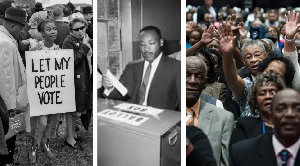 When African Americans got the right to vote - Original photo credits: LiBGuides, Essence
When African Americans got the right to vote - Original photo credits: LiBGuides, Essence
The struggle for African Americans to secure voting rights was a turbulent process, marked by numerous setbacks and fierce resistance. Yet, despite the challenges, a significant victory was achieved with the passage of the 15th Amendment to the United States Constitution on February 3, 1870.
The 15th Amendment marked a pivotal moment in American history, prohibiting the denial of the right to vote based on race, color, or previous condition of servitude.
However, the amendment’s promise was not fully realized for many years, as various discriminatory practices—such as literacy tests, poll taxes, and outright voter suppression—were implemented, particularly in Southern states, to disenfranchise African American voters.
The 15th Amendment: A Landmark Decision
The ratification of the 15th Amendment was a crucial milestone during the Reconstruction Era, coming in the wake of the Civil War. Its passage granted newly freed African American men the right to participate in the electoral process, aiming to integrate them into the political fabric of the nation.
Despite this legal guarantee, African Americans continued to face significant obstacles designed by Southern states to circumvent the amendment.
The Civil Rights Movement and the Voting Rights Act of 1965
The Civil Rights Movement of the 1950s and 1960s brought renewed focus to the ongoing fight for voting rights. Activists, including Martin Luther King Jr., and organizations such as the Southern Christian Leadership Conference (SCLC), the Student Nonviolent Coordinating Committee (SNCC), and the NAACP, organized protests, marches, and voter registration drives to highlight the systemic disenfranchisement faced by African Americans.
Their efforts culminated in a critical turning point with the passage of the Voting Rights Act of 1965, signed into law by President Lyndon B. Johnson. The act aimed to eliminate the barriers that had long prevented African Americans from exercising their right to vote. It outlawed racial discrimination in voting, provided federal oversight in areas with a history of discriminatory practices, and abolished literacy tests and other mechanisms used to disenfranchise voters.
Continuing Challenges and Progress
Despite the Voting Rights Act’s landmark achievements, the struggle for voting rights continues. Recent debates over voter ID laws, redistricting, and other policies have raised concerns about the accessibility and fairness of the voting process for African Americans and other minority groups.
Nevertheless, African Americans have made significant strides in political representation, with increased voter participation and a growing number of African American officials holding public office at local, state, and national levels.
As we reflect on this history, it’s important to consider how it feels to exercise the hard-won right to vote in the upcoming November elections.